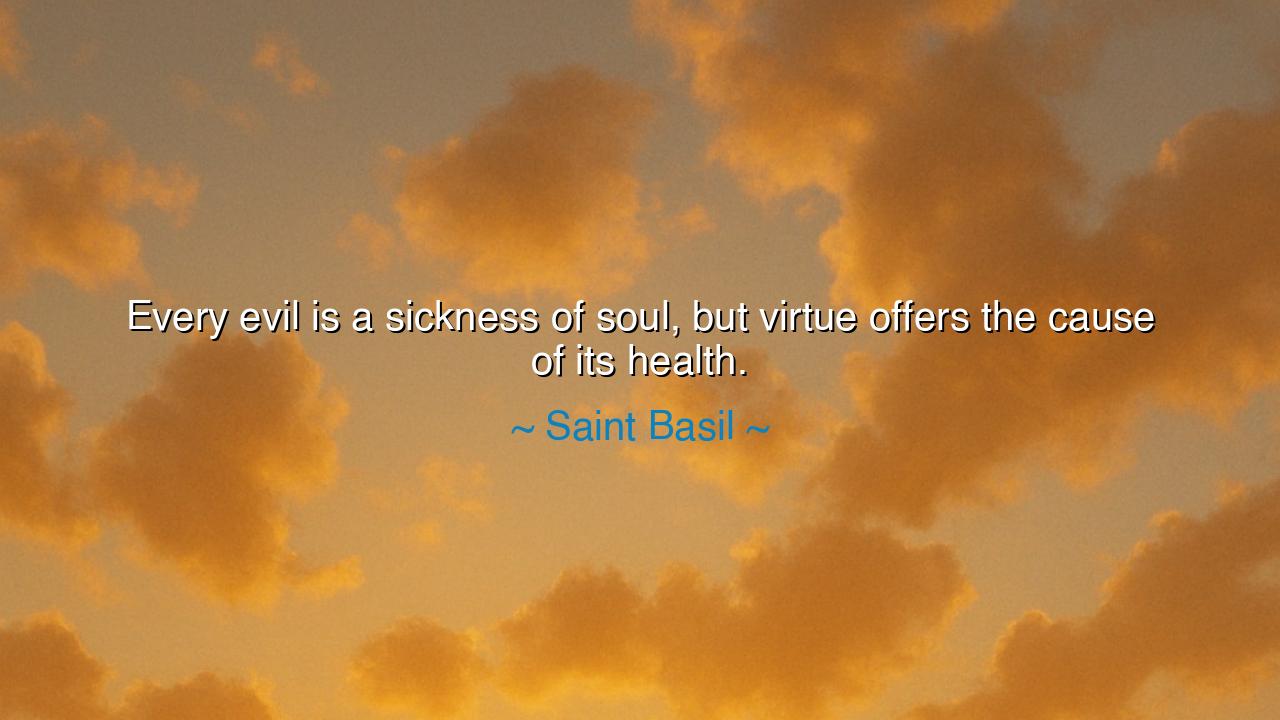
Every evil is a sickness of soul, but virtue offers the cause of






The words of Saint Basil, “Every evil is a sickness of soul, but virtue offers the cause of its health,” flow like sacred medicine from the heart of early Christian wisdom. In them, we hear the echo of an ancient truth: that the soul, like the body, can fall into disease—not of flesh, but of spirit. Anger, greed, pride, envy, and hatred are not merely wrong actions; they are symptoms of a deeper disorder within the human heart. And as sickness demands a cure, so too does evil require virtue—the divine remedy that restores harmony to the inner being.
In Saint Basil’s time, the world was fractured by corruption, war, and spiritual decay. He saw how men sought health for the body while neglecting the wounds of the heart. From his monastery in Cappadocia, he tended to both body and soul, teaching that true healing begins within. For just as a fever signals imbalance, so too do our sins signal separation—from God, from truth, from ourselves. Thus, the origin of this quote is not a philosophical speculation but a pastoral insight, born from his care for broken souls. To Basil, virtue was medicine: humility healed pride, generosity cured greed, and compassion soothed cruelty.
Consider the tale of John Newton, the 18th-century slave trader who became a preacher and wrote “Amazing Grace.” His life was once the embodiment of soul-sickness—driven by profit, hardened by cruelty, blind to human pain. But when a storm nearly took his life, he saw the sickness of his spirit laid bare before God. In repentance, he turned toward virtue—toward mercy, empathy, and redemption. Through service and song, he found what Basil called the “health of the soul.” From that transformation rose one of humanity’s most powerful hymns—a testament that virtue indeed heals what evil destroys.
The image of the soul as a living organism is both beautiful and grave. It reminds us that every thought, every action, either nourishes or poisons the inner life. When we let resentment fester, we invite disease. When we cultivate forgiveness, we renew our strength. Evil is not an external enemy; it is the rot within when we turn away from light. But virtue—that quiet discipline of goodness, patience, courage, and love—acts as the divine physician, purifying what was tainted, restoring what was lost.
Saint Basil’s teaching carries the authority of experience. He did not preach from ivory towers but from the dusty roads of service—feeding the poor, caring for the sick, and reminding all that the body’s decay is nothing compared to the sickness of a soul estranged from virtue. He understood that no law, no punishment, can truly cure evil—it must be healed, not merely restrained. For the heart, once restored to goodness, becomes its own guardian.
The message, then, is timeless: we must tend to our souls as carefully as we tend to our health. Reflect daily on your thoughts. Seek humility when pride rises. Practice kindness where bitterness lingers. As the ancients taught, “As the body becomes strong by exercise, the soul becomes pure through practice of virtue.” Do not despise the struggle—it is the sign that healing has begun.
Let every man and woman remember this sacred balance: the sickness of the soul begins with neglect, but its health is renewed through mindful acts of virtue. To forgive when wronged, to love when hurt, to act justly when tempted to deceive—these are the medicines that restore the heart’s vitality.
And so, as Saint Basil would counsel across the ages: Do not seek to be merely unbroken; seek to be whole. For the soul that chooses virtue is not only healed—it becomes a light to others, a living proof that every evil can be overcome when the spirit learns again to love the good.






AAdministratorAdministrator
Welcome, honored guests. Please leave a comment, we will respond soon